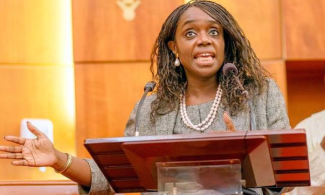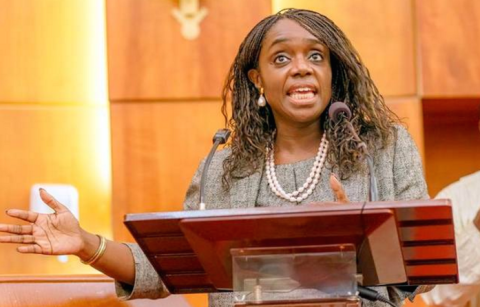
It is important we ascertain the reason(s) for this Economic crisis currently facing our country in order to devolve and deploy appropriate remedies and solutions to the problem. Why is Nigeria in Economic recession? We are in a recession because of the crash in oil prices and as well as low oil production, caused by the activities of Niger Delta avengers and similar economic saboteurs. Nigeria has always lived on "borrowed" times, and it exposes its underbelly anytime there is a sustained oil price drop. No matter what NBS or any other Econometricians says Oil remains the lifeblood of the Nigerian economy, and revenue and foreign exchange earnings from it drives every other sectoral component of our GDP, including Services, Agriculture and what passes as manufacturing (largely Assemblage of imported Knocked Down parts and materials.),
A 60% drop in Oil Revenue and Foreign exchange earnings is the immediate cause of the current crisis. However there has always been structural deficiencies in the system (Economy) over the years which ensured there was little or nothing by way of infrastructural development and value added production- poor Roads, epileptic Power,little human capital development by way of appropriate Health and Educational funding- nor did the country save during its years of boom to act as a buffer against the rainy days which is now pouring upon us all. The Country also lacked the technological and Managerial ability to run a decent skill-based economy, worsened by corruption and planlessness.
To get Nigeria out of the Recession as quickly as possible government should do the simple thing first: Find a way to negotiate and dialogue with restive militant Niger Delta groups and their leaders and sponsors. A two prong approach of Carrot and the Stick should be applied to ensure that no new group(s) will be able to cause mayhem and disrupt Oil production now and in the immediate future. The Presidency as well as the National Assembly (Senators and members of the HOR) should be seen to be making sacrifices by reducing their humongous allowances and emoluments, alleged to be one of the highest in the world, not just sermonising on whether or not Government should sell National Assets in the floor of the House. That way ordinary Nigerians will appreciate their sacrifices and adapt to the Government’s “Change begins with me” mantra!
BORROW OR SELL NATIONAL ASSETS- Are there other alternatives?
It is important to understand that Borrowing has a Cost, even though the costs (Debt service and repayment may be postponed for the future generation to bear). The 2016 Budget (about N6.1Trillion) has a built in N2.2Trillion Deficit, the bulk of which will be financed by Borrowing. At 17%, Nigeria still has a low Debt to GDP ratio and so advocates of borrowing for Nigeria may have a good case. However Nigeria’s Debt Service to Revenue ratio is quite high at 35%, Nigeria is using a whooping N1.36Trillion to service debts in the 2016 Budget. That figure may be exceeded if Government has been forced to borrow more locally to meet its projected Revenue ( about N3.9Trillion originally ) shortfall for the year, in the face of Bank hikes in Cost of Borrowing (likely rates of between 16-22% following MPC rates hike to 14% since July 2016). Why waste N1.5Trillion on unproductive Debt servicing if there could be alternative Cash inflow that will not immediately require an outgoing? There is also the need to boost our Foreign Reserve and help stabilise the Naira value which is taking serious pummelling on a daily basis and the consequent spiral inflation in the system causing more misery to an already bartered citizens.
This is where the case for Assets Sales may be useful, so long that the Sales are properly done preferably through the BPE, if that quango still exists. Asset sales is not a “Zero sum game.” The Nigerian people loses an Asset (Fixed Assets) to the buyers, and the People, represented by her government gets Cash (Current Assets) which it can deploy into several uses, including their application to acquire other productive Fixed Assets. The government should however, only sell those assets that are loss making or drain pipes, where it is still carrying on with its running costs (Recurrent costs like Salaries and maintenance) when not earning any marginal revenue either now or in the foreseeable future. Whilst I would not recommend the sales of NLNG, there is no reason why the four refineries cannot be sold to competent hands in the private sector or foreigners who can manage them better and stop the haemorrhage of Forex on importation of Fuel products. The government may also consider Asset striping sales, and Asset Concessioning over a short period of lease in a commercial arrangement that ensures it earns some needed Cash at these difficult periods and then take back when its ‘Cash flow position improves. What will matter most is that these transactions are done at “arms length,” devoid of nepotism and favouritism and the prices and valuation are properly and scientifically achieved- bearing in mind the forecasting of Cash flows, inflation effects, Risk and uncertainties affecting those cash flows, cost of capital and appropriate discounting for long term Capital Assets. Those who argue that we are mortgaging our tomorrow miss the point that if Nigeria can’t survive today, there may be no tomorrow. Nigeria is currently in A & E and need Emergency treatment from its health carers!
The government must have the final say. They should be able to take certain decisions and live with the consequences, not panicking because of pressure from opposition politicians and non-altruistic “Economists and Professionals,” who badger them into different policies without waiting for one to work only to come back and accuse the government of not being “inconsistency” and flip-flopping when those advice don’t work.
In the longer term, the Nigerian economy needed to be restructured into a productive one rather than the rent-economy it has been for the last 45 years or thereabout. The current pain is getting unbearable because this huge expanse of land (Nigeria’s geographical space), and its 170million people with high taste for foreign goods and services depended on a mono-product sale to service all their needs. It was alright when Oil prices soared to $100 and above but that appetite and needs could never be sustained with a $50 or less Oil price. Nigeria must among other things:
- Diversify the economy, away from a Crude oil Sales-based one to one where a greater proportion of its crude production are processed into Petroleum products and Agro-chemicals, adding much value and therefore more income and employment creation potentials before export; It should move into areas where Nigeria might have comparative advantage- Agriculture ( again not sales of primary products whose prices are determined by western consumers, but value-added processing to finished products and bye-products), Solid minerals extraction and processing of bye-products and Tourism.
- Immediate reshaping of its entire shambolic infrastructural systems, including its Security, Transport and Power to ginger private, commercial investment and job creation.
- Rapid industrialization from within Nigeria, not waiting for "foreign investors."
- Development of its technology to a level where it can compete globally- some of these Universities may be converted to pure Technical colleges well equipped to retrain current unemployed graduates in any technical subject area; on-the- job technological training should be encouraged rather than the so many almost worthless degrees in the field of Science and Technology.
- Gradually restrict the export of pure primary products, and more of value added, consumer and semi- processed intermediate goods which attract far higher prices and create more employment and Foreign exchange earnings potentials.
Tony Ishiekwene
